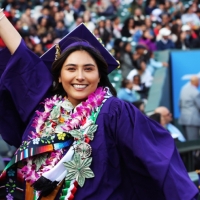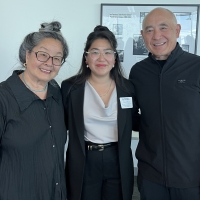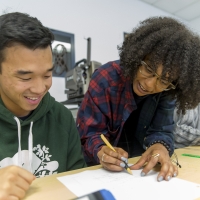The two 2020 recipients of the Professor Morris R. Lewenstein Scholarship, Allison Phuong and Michael Brodheim are at different stages of their lives and careers. But like the scholarship’s namesake, they are both lifelong learners, constantly striving to improve themselves despite challenging lives. The scholarship, each says, gives them some breathing room as both work full-time while working toward their degrees.
Sociology major eyes career as mental health social worker
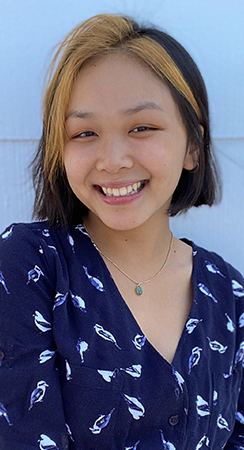
Allison Phuong, a junior majoring in sociology, applied to and was accepted by eight universities, but chose SF State after considering family and financial concerns. “Looking back now [that decision] was one of the best decisions I have ever made in my life,” Phuong wrote in her scholarship application. “In my three years at SF State, I have found some of the most amazing professors, advisors, and classmates who have helped me to see my strengths that I otherwise wouldn’t have been able to find on my own.”
After graduating, Phuong, who has worked full-time to support her family throughout her undergraduate years, wants to continue her education and attain a master’s degree in social work. She especially wants to help people cope with mental health issues — her father suffers from bipolar disease, and she grew up experiencing the challenges associated with it.
“Through helping my father, I saw how much I wanted to pursue a career in helping those who need help and the many who want it. I have a passion for helping with mental health, whether for young adults or parents of any age or older people suffering from mental illness, or families with someone who’s mentally ill. I know that can be kind of broad but my passion for mental health will allow me to work with different demographics,” she says.
The Lewenstein Scholarship, Phuong says, will help make the grad school application process less stressful. “I can go into applying for grad school with a wider lens and wider scope in terms of which schools and programs I apply to. It’s provided a cushion for me so I don’t have to be as stressed about planning ahead. It helps me keep one foot in the present and one in the future.”
Phuong has sometimes worked two or three jobs while attending SF State. “There has yet to be a semester where I haven’t taken on a full-time course load of work, part-time work, and volunteering,” she says. “Additionally, I have a full-time commitment to my family. When my father lapses into manic episodes, I have to step up to help them financially and emotionally.”
“[The Lewenstein Scholarship] has provided a cushion for me so I don’t have to be as stressed about planning ahead. It helps me keep one foot in the present and one in the future.”
Allison Phuong, an undergraduate student in the Sociology program
She says her advisor Taryn Wong has had a strong stabilizing influence on her. “She was such a concrete, supportive figure for me. I could always come back to her consistently every semester. I never had that person before.” Phuong hasn’t ruled out the possibility of becoming a college counselor herself, once she is finished with grad school. But her ultimate goal is to find balance. “I want to support my family but also support my own independent dreams, and to be happy while giving back to the community.”
Master of Public Administration student seeks to contribute through nonprofit work
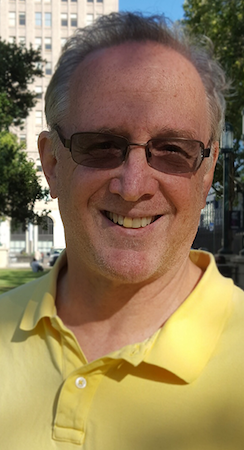
Giving back to the community is also a goal for Michael Brodheim. After being incarcerated for 35 years and then released in 2015, Brodheim found a welcoming place at SF State through Project Rebound. Prior to being incarcerated, he had received an undergrad degree from MIT; he then continued his education while in prison, obtaining a master’s degree from Antioch University and working as a paralegal helping other prisoners.
Upon his release, however, he discovered that finding a job was much harder than he’d anticipated. “Even in workplaces that hired formerly incarcerated people, I would lose out to someone who had just gotten a degree.” He says he realized he needed to rectify that gap and rebrand himself as not just someone who recently came out of prison but someone with a master’s degree in public administration.
His interest in public administration came from the advocacy and paralegal work he did while in prison for others who were incarcerated. “While incarcerated I learned firsthand that the criminal justice system — a system I formerly believed operated fairly — operates instead in a manner which disproportionately impacts people of color and poor people, helping to ensure that they remain effectively stymied from ever reentering mainstream society,” he wrote in his application for the scholarship. Brodheim’s name appears on two published federal cases: One upheld the rights of a prisoner to engage in protected activities under the First Amendment without being subjected to retaliation by prison officials.
"I feel extraordinarily lucky to have this second chance to breathe fresh air. The air outside has a different quality to it than the air on the inside. [And] I am grateful for the welcoming culture at SF State, where I am treated as a human being.”
-Michael Brodheim, a graduate student in the Master of Public Administration program
Brodheim hopes to finish his master’s degree in the fall of 2021; he works full-time and takes two courses each semester. Despite the challenges, he is grateful and appreciative for the second chance he’s been given in returning to society and the opportunities he’s found at SF State. “I feel extraordinarily lucky to have this second chance to breathe fresh air. The air outside has a different quality to it than the air on the inside.” He describes his experience at SF State similarly. “I am grateful for the welcoming culture at SF State, where I am treated as a human being. Such a breath of fresh air!”
While he works toward his master’s degree, he’s working full-time at the Prison Law Office in Berkeley as a litigation assistant. He monitors prison conditions to make sure that prisoners receive appropriate medical and mental health care, among other concerns. “We want to ensure that the prison system does a better job than it would if we were not looking over their shoulders,” he says.
Having witnessed firsthand the effects of structural discrimination, Brodheim hopes he can work to change the wrongs he’s seen. He says, “I made an unforgivable mistake, and I want to give back to the community I grievously harmed. I don’t know that I can balance the scale but I’ll make an effort to do the right thing as much as I can every day and hopefully make some contribution.” He believes a master’s degree in public administration will help him do that. “It will give me an avenue through which I can hopefully give back to the community in some capacity while working in a nonprofit.”


